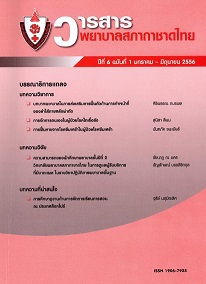การฟื้นหายจากโรคซึมเศร้าในผู้ป่วยโรคซึมเศร้า
Keywords:
การฟื้นหาย, โรคซึมเศร้า, อาการซึมเศร้า, recovery, depressive disorder, depressive symptomAbstract
ปัจจุบันการรักษาผู้ป่วยโรคซึมเศร้าจะมีวิธีการต่างๆหลายวิธี ทั้งการรักษาด้วยยา การรักษาด้วยไฟฟ้าและจิตบำบัด แต่พบว่ามีผู้ป่วยจำนวนมากที่ไม่สามารถควบคุมอาการและมีอาการกำเริบของโรค การฟื้นหาย (Recovery) จากโรคซึมเศร้าเป็นเป้าหมายหลักที่บุคลากรทางการแพทย์ให้ความสนใจเพื่อมุ่งไปสู่ผลลัพธ์ที่ดีสำหรับผู้ป่วยโรคซึมเศร้า ซึ่งการฟื้นหายของผู้ป่วยโรคซึมเศร้าเป็นกระบวนการเปลี่ยนแปลงทัศนคติ ค่านิยม ความรู้สึก เป้าหมาย ทักษะ พฤติกรรม และบทบาท ส่งผลให้สามารถปรับตัวอยู่ได้อย่างมีความสุขแม้จะยังมีอาการซึมเศร้าหลงเหลืออยู่ การฟื้นหายยังรวมไปถึงการให้ความหมายในชีวิต วางเป้าหมายในชีวิตใหม่ เกิดการเติบโตขึ้นจากผลกระทบการเจ็บป่วยทางจิตใจที่ได้รับ รู้สึกว่าตนเองมีคุณค่า คืนความสำคัญให้กับตนเอง เกิดการเติบโตในตัวเอง จนสามารถช่วยเหลือตัวเอง สามารถปฏิบัติหน้าที่การทำงานต่างๆได้อย่างมีประสิทธิภาพมากที่สุดเท่าที่พึงกระทำได้ตามศักยภาพของแต่ละบุคคล และสามารถดำรงชีวิตอยู่ในสังคมได้อย่างปกติสุข พยาบาลควรเข้าใจกระบวนการฟื้นหายและปัจจัยที่เกี่ยวข้องกับการฟื้นหาย และนำองค์ความรู้ที่ได้เป็นแนวทางในการพัฒนาการให้การพยาบาลผู้ป่วยโรคซึมเศร้า เพื่อช่วยเหลือผู้ป่วยโรคซึมเศร้าให้มีการหาย และยืดระยะเวลาการกลับเป็นซ้ำของโรคนี้ให้นานที่สุด บทความนี้จะนำเสนออุบัติการณ์การเกิดโรคซึมเศร้า กระบวนการหายจากโรคซึมเศร้า ปัจจัยที่เกี่ยวข้องกับการหายจากโรคซึมเศร้า และบทบาทของพยาบาลในการส่งเสริมให้ผู้ป่วยฟื้นหายจากโรคซึมเศร้า
Recovery from depressive disorder
At present, a person with depression can be treated in several ways such as medication, electroconvulsive therapy, and psychotherapy; however, many patients still experience relapses and recurrences. Recovery from the depressive disorder is the main goal that medical personnel focus on so as to achieve favorable outcomes for patients. Recovery from depression of patients with major depressive disorder is the process of changing attitudes, values, feelings, goals, skills, behaviors and roles. It affects adaptation and well-being even though the patient has suffered partial remission. Recovery – furthermore, referring to the meaning of life, setting goals for the new life, growth from the effect of mental illness, sense of self-esteem, and perception of self-growth until the individual can help themselves to work as effectively as possible – should be made based on the ability of an individual, and also means living happily. The nurse should have understanding about the process of recovery from depression and the factors related to recovery from depression and apply the knowledge derived from this study as the baseline data to develop clinical nursing practice guidelines to promote recovery from major depressive disorder and prevent relapses. This article presents the incidence of depression, process of recovery from depression, factors associated with recovery from depression, and the role of the nurse in promoting patients' recovery from depression.
Downloads
Issue
Section
License
เนื้อหาบทความหรือข้อคิดเห็นต่างๆ ในวารสารพยาบาลสภากาชาดไทยนี้ เป็นความคิดเห็นของผู้เขียนบทความ ไม่ใช่ความเห็นของกองบรรณาธิการ หรือสถาบันการพยาบาลศรีสวรินทิรา สภากาชาดไทย






